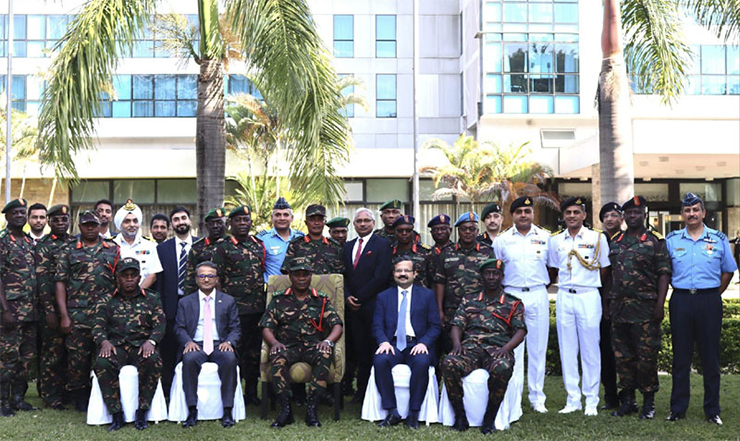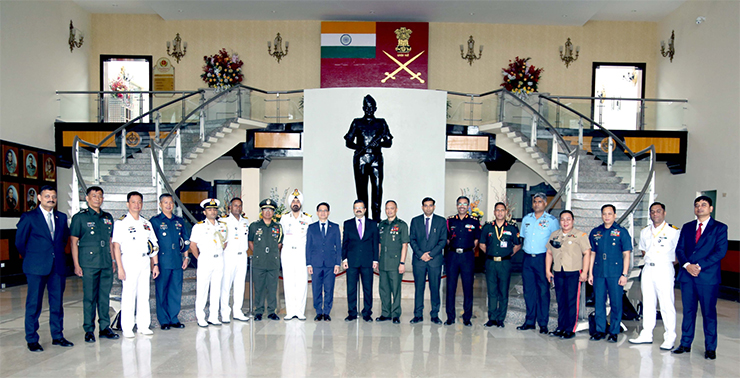150 total views, 1 views today
https://raksha-anirveda.com/indias-defence-diplomacy/
In a strategic move, coupled with its growing ambitions to increase its international clout, India has announced that it will appoint 16 Defence Attaches in many African nations. So far Indian maintains a corps of around 50 Defence Attaches in its various diplomatic missions abroad. Asad Mirza analyses the need to take this step, when the regional tensions are at their highest
In a first, India will post defence attaches in several countries, with a focus on Africa, aimed at strengthening strategic ties and military diplomacy amid China’s increasing efforts to expand its influence in the African nations.
New Delhi has announced that it will appoint new defence attaches in the African countries of Ethiopia, Ivory Coast, Mozambique, and Djibouti. This decision is in line with India’s priority to expand its strategic engagement with the continent, as reported by PTI.
Furthermore, India will post defence attaches in the Philippines, Armenia, and Poland as well. New Delhi is also planning to rationalise its teams of military officials in its embassy in Moscow and high commission in London, as per the report. A few of the defence attaches posted in these nations are set to be deployed in other regions as part of the rationalisation process.
As many as 16 defence attaches from the Indian Army, the Navy, and the Air Force will assume their new positions soon. The move comes in the backdrop of increasing interest shown by many African countries to obtain Indian military platforms, equipment, and hardware.
India will post defence attaches in the Philippines, Armenia, and Poland as well. New Delhi is also planning to rationalise its teams of military officials in its embassy in Moscow and high commission in London
Over the past few years, India has established itself at the forefront of the global diplomatic stage, flagging concerns, challenges and aspirations of the Global South or the developing nations, especially the African continent.
India’s relationship with Africa saw an upward tick amid China’s consistent efforts to expand its influence in Africa. The induction of the 55-nation African Union as a permanent member of the G-20 was seen as a major milestone in India’s presidency of the grouping of the 20 big economies of the world last year.
The latest Indian move could be seen as an effort to counter China in these African nations, where China seems to have marked a firm footprint. Only last month, External Affairs Minister S Jaishankar had said that countries of the Global South feel for each other on several issues. Addressing an event during his visit to Tokyo, the minister highlighted India’s leadership in the Global South and mentioned two meetings it convened to listen to various concerns of 125 countries, even as it bashed China for skipping those.

He further stated that the Global South doesn’t consider it to be a “coincidence” that “it was under the Indian presidency that the African Union, which had long been promised a seat in the G20, got a seat”. “So the Global South believes us,” he said.
In addition, India is also looking at further expanding defence ties with the Philippines against the increasing global concerns over China’s increasing military assertiveness in the South China Sea.
The decision to post a defence attaché in Poland, a member of the European Union (EU), is reflective of India’s desire to expand two-way defence ties
These two countries have also been witnessing a boost in their relationship over the past few years. In January 2022, India sealed a $375 million deal with the Philippines for supplying three batteries of missiles.
India’s decision to appoint a defence attaché in Armenia came as the country, located in the Caucasus region and a former Soviet member, shows keen interest in deepening ties with the Asian nation. In 2023, an arms deal to supply Indian military hardware including multi-barrel rocket launchers to Armenia was firmed up.
The decision to post a defence attaché in Poland, a member of the European Union (EU), is reflective of India’s desire to expand two-way defence ties. Last year, the EU posted a military attaché to its mission in India for the first time.
It is not as if the Indian strategy to increase its presence in these African nations is something new. The first Africa-India Field Training Exercise, AFINDEX-19, was held at the Foreign Training Node at Aundh Military Station in Pine, way back in 2019. Contingents from 17 African countries, and from the Indian Army, participated in the exercises that focused on Humanitarian Mine Assistance and UN Peacekeeping Operations.
Expanding the footprint of its defence manufacturers amongst the African nations is nothing new, and the GoI has been working quietly over the years to establish a flourishing defence trade with the African nations
The 17 participating nations were: Benin, Botswana, Egypt, Ghana, Kenya, Mauritius, Mozambique, Namibia, Niger, Nigeria, Senegal, South Africa, Sudan, Tanzania, Uganda, Zambia and Zimbabwe. Maratha Light Infantry’s Jangi Paltan represented the Indian contingent.
In his address at the concluding parade, the then Army Chief Gen Rawat had said that the strong political affinity between India and Africa stems from a shared struggle against colonial yoke. Post-colonial India and Africa have risen rapidly amidst the international community, becoming the harbingers of a luminous tomorrow. India’s role in promoting world peace finds a synergistic partner in the commitment of the African nations, to reduce conflict in the African continent through collaborative peacekeeping operations under the UN mandate.

The concluding ceremony of the exercise was followed by an equipment display organised by the Federation of Indian Chambers of Commerce and Industry (FICCI). As many as 11 categories of indigenously-developed defence related equipment, made by agencies such as Ordnance Factories, Defence and Research Development Organisation (DRDO), as well as private sector companies and start-ups, were displayed.
Commenting on the display, Gen Rawat had said that the equipment display that was a humble attempt to showcase the emerging Indian defence industry and the commitment to produce world-class military hardware at affordable costs. The defence industry is keen to support the African nations in acquiring latest military hardware aimed at capacity enhancement in tune with the emerging trends.
This shows that expanding the footprint of its defence manufacturers amongst the African nations is nothing new, and the GoI has been working quietly over the years to establish a flourishing defence trade with the African nations. The strategy makes sense particularly in the face of intermittent complaints about the quality of Chinese supplied defence equipment. India on its part is capable of offering these nations quality at a much lower price and at mutually beneficial terms.
Indian efforts at increasing its defence diplomacy reflects its growing strategic ambitions and being called leader of the Global South
Indeed it would be a big step for Indian defence manufacturers from becoming Aatmanirbhar itself, to help other nations also to become well equipped and self-sustaining.
Overall, Indian efforts at increasing its defence diplomacy reflects its growing strategic ambitions and being called leader of the Global South. By effectively addressing the regional challenges and capitalising on the opportunities, India can significantly enhance its security and position as a major global player. And contribute effectively to global and regional peace and stability, with focused attention to defence diplomacy in the coming years.
